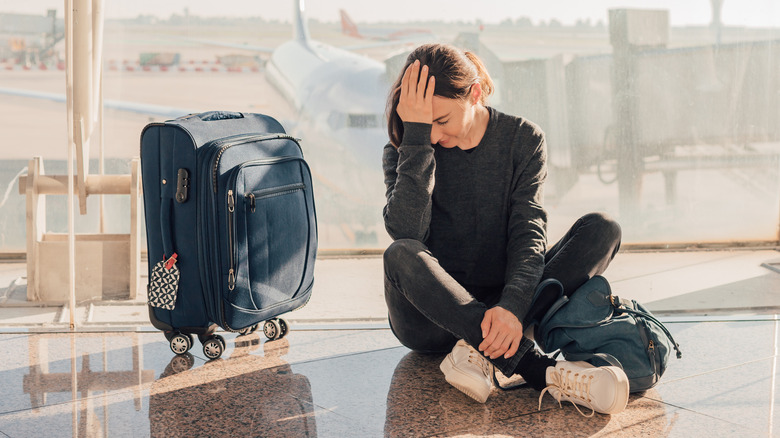What Travel Insurance Covers If A Hurricane Cancels Your Trip
There's no overstating how important buying travel insurance is whenever you go on a lengthy trip. You can get away without having one if you're just going on a staycation or nearcation two hours outside town. However, if you're embarking on a cruise, traveling halfway across the country, or even internationally, travel insurance offers the protection you need against incurring hefty financial losses, especially if your trip gets canceled through no fault of your own.
"Travel insurance is often an overlooked investment until the unforeseen happens," Beth Godlin, a spokesperson of Aon Affinity Travel Practice, told CNBC Select. "It's designed to give travelers peace of mind and financial protection against the risks of travel." People sometimes think that travel insurance is merely a superfluous expense, but per Godlin, if you think investing in one is unnecessary, try gauging "what you could stand to lose if you had to cancel last-minute."
No one can tell when a disaster could strike. Even if you meticulously plan a trip down to a tee, it could still end abruptly or even get canceled altogether in the event of natural disasters like hurricanes, typhoons, tornadoes, windstorms, and more. Travel insurance is especially critical if you're heading to hurricane-prone areas during hurricane season, which is from June to November, as the likelihood of a trip disruption is high. If that happens, insurance can help you recoup most, if not all, of the money you've spent on bookings.
It can reimburse your non-refundable expenses
Travel-related costs are no joke. A 3-day vacation within the country can set back a solo traveler an average of $1,400, or $3,600 for a family of four. With the hefty expenditure, you don't want to lose what you sprung for in case a hurricane — or any natural disaster — cuts your trip short or if it gets canceled completely.
Travel insurance allows you to recoup your losses should inclement weather disrupt your plans. For instance, if your plane gets significantly delayed or canceled or your destination becomes uninhabitable, you can be reimbursed for non-refundable and prepaid expenses for the entire trip or portions of it (that is, if you're already mid-trip). "If your flight is affected by a hurricane and you get stuck somewhere, travel insurance could reimburse you for extra hotel, meal, and local transportation costs until you can get the next flight out," Terry Boynton of Yonder Travel Insurance explained in a press release.
You cannot choose when the insurance kicks in, however. If you're worried about a hurricane affecting your destination and decide to cancel the trip based on your gut feel, you might not receive a reimbursement. Insurance provider Travel Guard pointed out to USA Today that a hurricane must "directly affect your travel arrangements or accommodations" for it to work. For greater flexibility, you can opt for a "cancel for any reason" (CFAR) insurance, but those are significantly pricier and don't reimburse 100% of your trip.
It can also provide emergency assistance
Many travel insurance plans also provide 24-hour assistance, which could be a lifesaver during dire times. The provider can help you with things like finding the nearest doctor, or booking transportation should you need to evacuate. "In the case of a natural disaster at your destination or sudden civil unrest, everyone might be trying to leave the location at the same time, which can overburden transportation resources. A good travel assistance provider can be an asset," Scott Adamski, a spokesperson for insurance provider AIG Travel, told Forbes. If your plan covers medical coverage, it could also prove to be helpful in reimbursing your expenses should you get sick or injured, especially outside of the country as Medicare and Medicaid don't work abroad, as per Travel.State.Gov.
Travel insurance should be on your list of priorities when you travel. Just remember to purchase it right away, because if a hurricane gets named before you secure your policy, your subsequent claims have a high chance of receiving a denial. "The thing you need to remember about travel insurance, we only cover unknown, unforeseen events," Daniel Durazo of Allianz Partners USA told USA Today. "Once a hurricane is named, then it's considered a known event. Insurance doesn't cover foreseeable circumstances."


